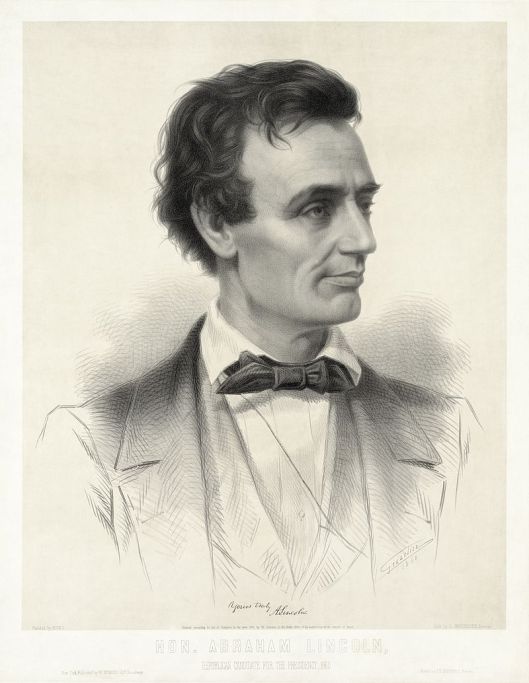Tags
abolition, characterization, Civil War, historical fiction, honor, Illinois, Lincoln, Mary Todd, slavery, Springfield, Stephen Harrigan
Review: A Friend of Mr. Lincoln, by Stephen Harrigan
Knopf, 2016. 411 pp. $28
On a recent trip to the nation’s capital, my son and I visited the place where Lincoln died, a boardinghouse across the street from Ford’s Theater. It’s a museum now, as you might expect, whose exhibits testify to the immense power Lincoln’s memory exerts, regardless of political belief. Conflicting visions of his motives and character roll off the presses year after year. In fact, the museum has built a pile of books two stories high, a brave project, given that sooner or later, the historical Babel must punch through the roof. What a fitting metaphor for the man who towered above his contemporaries in more ways than one.
Consequently, it’s fair to ask, “Why another?,” even as the echo rebounds, “Why not?” But Stephen Harrigan has made a strong case with his novel about the political formation of his hero in 1830s and 1840s Illinois. However, for better and worse, the story begins just after his assassination in 1865, as the town of Springfield mourns over the coffin that has made its sad voyage from Washington. Two friends of his–one fictional, one real–talk about setting the record straight about their late friend, a task that Harrigan seems to have zealously taken up. That too, is for better and worse.

Thomas Hicks painted a portrait of Lincoln in 1859. This lithograph made from it figured in presidential campaign literature in 1860 (Courtesy Library of Congress via Wikimedia Commons).
Narrating this tale is Micajah (Cage) Weatherby, a Springfield poet and businessman, the author’s brilliant creation, a man who befriends Lincoln during the Black Hawk War of 1832. As a convinced abolitionist, freer with his passions, less concerned with how things look than how they feel, he’s a perfect foil for Lincoln, who’s always looking over his shoulder to see what the electorate thinks and binds his heart to be ruled by law. It’s not that Lincoln the politico lacks any sense of right and wrong; on the contrary, he’s got a very highly developed one. However, it’s always subservient to his belief in order and justice, which is where he thinks honor lies, and honor means everything to him.
It’s no small task to write Lincoln’s character, but Harrigan does marvelously well, I think, partly by contrast to the young lawyer’s friends, all young men on the make:
Most . . . were smoother than Lincoln, not as raw, not as striking in appearance, not as obviously self-invented. During the [Black Hawk] war, when everyone had been clothed in rags and shriven by scant rations, he had not seemed so remarkable. Now that he was more or less respectably dressed, something in his appearance betrayed him. He looked like a man who did not quite fit in, whom nature had made too tall and loose-jointed, with an unpleasant squeaky voice and some taint of deep, lingering poverty. He seemed to Cage like a man who desperately wanted to be better than the world would ever possibly let him be. But in Lincoln’s case that hunger did not seem underlaid with anger, as with other men it might, but with a strange seeping kindness.
But to describe A Friend of Lincoln as a character study, even of such a momentous nature, does the book injustice. Harrigan has re-created the period and its tensions, whether over slavery, who gets what government contract, or who’s murdered whom. Everyone must take sides, which causes both personal and political animosities. Harrigan offers court cases, romances, near riots, a duel, and, most vividly, Lincoln’s stormy courtship of Mary Todd. Cage helps his friend through terrible bouts of depression and saves his life on at least two occasions, for which, one may argue, he was poorly repaid.
I dislike prologues and retrospective first chapters. I understand why Harrigan begins his story in 1865; he wants to show how the Lincolns, chiefly Mary, have thrust Cage out of their lives when once he was intimate friend to both. But that chapter is entirely unnecessary, and the “set-the-record-straight” talk is a timeworn device for telling a story. This one needs no excuses.
More seriously, I think, is Harrigan’s apparent ax to grind. He seems determined to accent the less attractive parts of Lincoln’s character, and though I like that as an antidote to the legend, I think the author may have gotten too caught up in his cause. What’s more, he often tells you what he wants you to think, perhaps as with the passage quoted above, when he’s more than capable of showing it. And from time to time, these statements confused me, because I’d come to a different conclusion entirely.
Nevertheless, I like this novel a great deal. As Lincoln himself might have said, it reminds me of a story; this one’s from the museum. When one of the president’s enemies accused him of being two-faced, he replied, “If I had another face, why would I show you this one?”
Stephen Harrigan has indeed shown us another face of Lincoln.
Disclaimer: I obtained my reading copy of this book from the public library.

Pleased to see you also enjoyed this one. Much as I admired it, I think Harrigan’s Remember Ben Clayton is better still.
The name Micajah is uncommon. It occurred to me to google it recently and saw that another man who bore the name was Micajah Autry, one of the defenders of the Alamo – and he was a poet as well. Given the author’s previous novel about the Alamo and interest in Texas history, it wouldn’t surprise me if there was a connection.
LikeLike
Thanks, Sarah. I didn’t know that. Have to look into the other book as well.
LikeLike